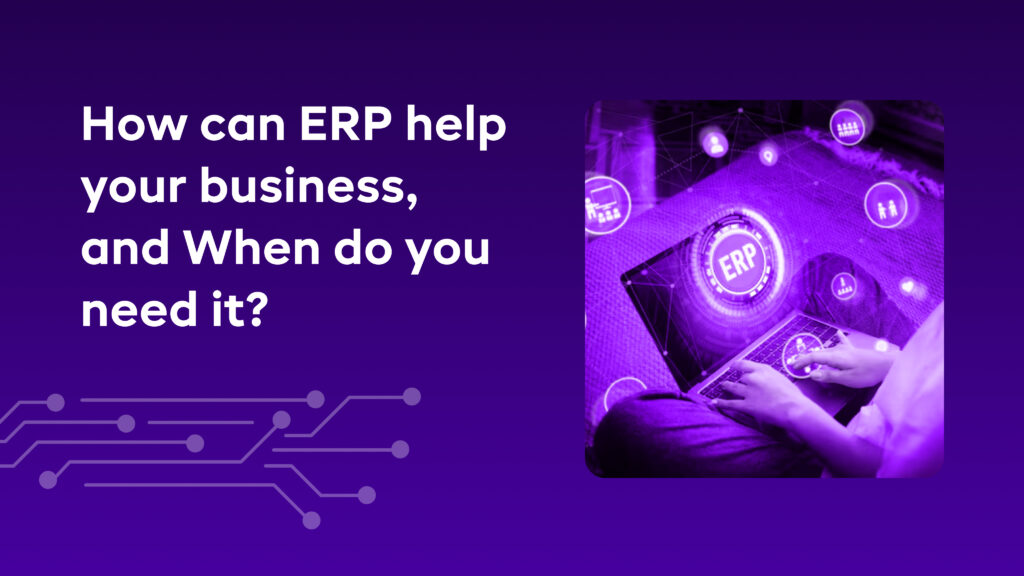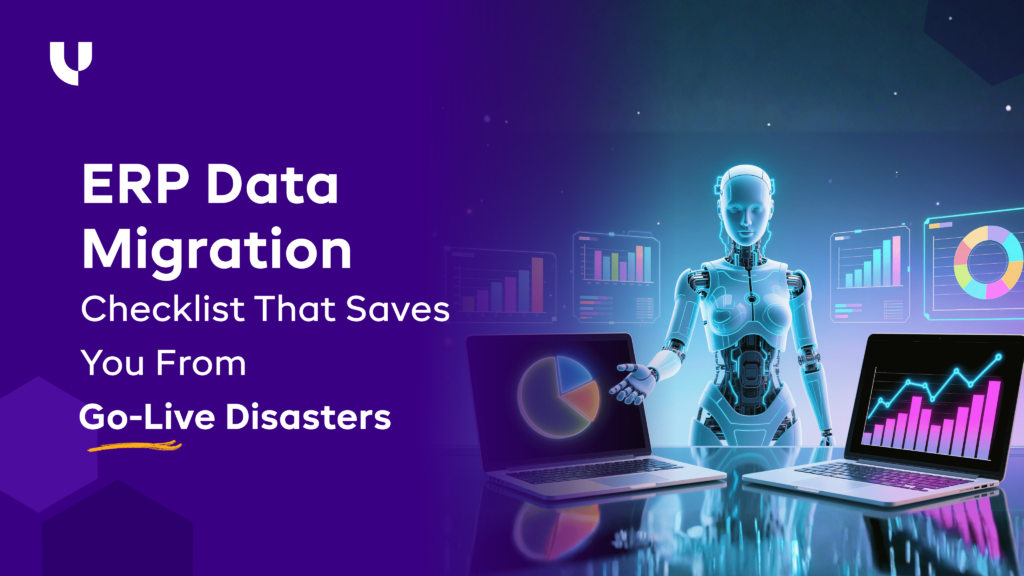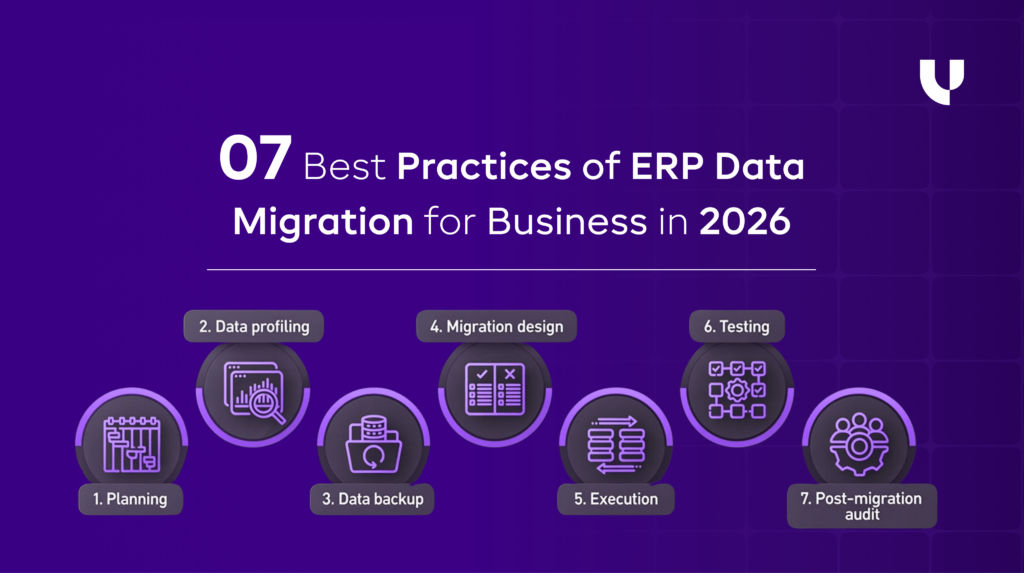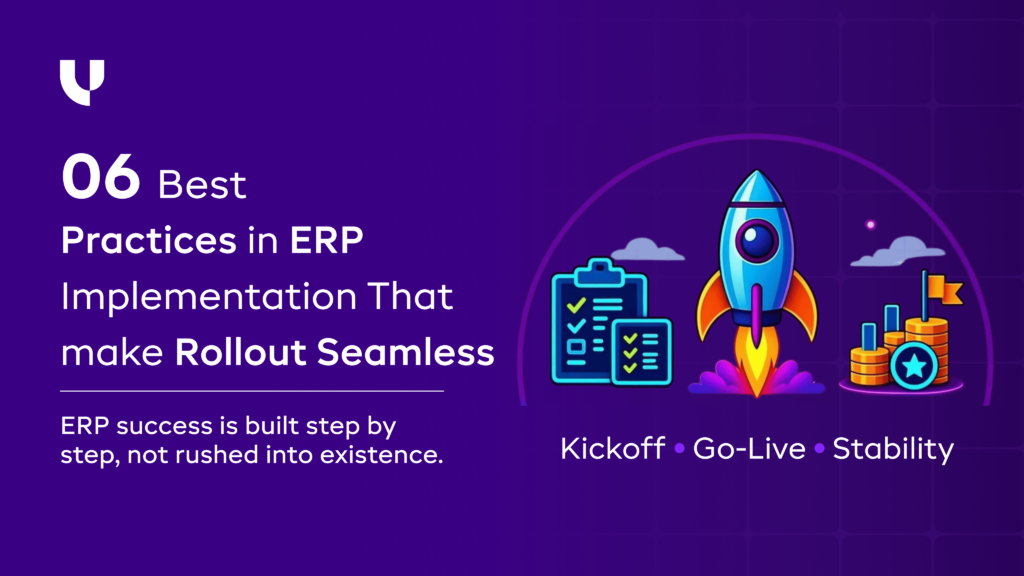How can ERP help your business, and When do you need it?
Published on January 6th 2023

Introduction
If you’re reading this, chances are your business has reached the stage where things work, but not always smoothly.
As your business grows, there comes a point where managing everything through spreadsheets, manual follow-ups, and scattered tools stops working. You start observing work delays, communication gaps, repeated errors, and a lack of visibility across teams. And somewhere in the middle of all these challenges, the term “ERP” starts showing up in conversations (and even in your searches, like how you reached here), sometimes as a suggestion, sometimes as a warning, and sometimes as a mystery.
Whether you’re already facing operational limitations, exploring how ERP can streamline your processes, or simply unsure if your business even needs one, this guide is built for you. You’ll get a clear view of what ERP actually does, the problems it solves, and the signs that tell you it’s time to consider one.
So before we talk about “when” you need an ERP, let’s start with the basics, understanding what an ERP really does and why it becomes a turning point for growing businesses.
What an ERP Really Does (Without the Technical Stuff)
At its core, an ERP brings your entire business onto a single, connected system so everyone works with the same, up-to-date information. No more five different apps saying five different things. No more spreadsheets that only one person knows about or has access to. No more guessing which version of the truth is correct.
It shifts you from a setup where teams operate in silos to one where everything, including sales, inventory, finance, procurement, and operations, runs in a single, unified flow.
Instead of:
- Multiple tools that don’t talk to each other
- People manually entering the same data in different sheets
- Information living in separate files, folders, and WhatsApp chats
- Constant follow-ups just to know “what’s the status?’
…you move to a unified system that keeps everything synced automatically.
And the best way to understand this is through real business scenarios (we’re sure, you might be facing at least one of these situations) because ERP makes the biggest difference in the moments where your current processes slow you down.
Want to start a project with us?
Empowering businesses to achieve greatness through strategic guidance and innovative solutions.
Book A Demo
How an ERP Helps: Real-World Examples and Clear Business Outcomes
1. You stop running your business on scattered tools
Why this matters for your business:
- When every team uses its own app or spreadsheet, you spend more time chasing updates than making decisions.
- A small manual error in one sheet turns into bigger issues across sales, inventory, finance, and operations.
- Repetitive tasks eat up hours every week—updating sheets, reconciling numbers, sending reminders, fixing mistakes.
How ERP helps:
- Everything shifts to a single connected system rather than five different tools.
- Data is entered once and flows automatically everywhere it’s needed.
- Approvals, workflows, and reports get automated, so teams stop operating in silos.
- Everyone follows the same process, reducing confusion and improving collaboration.
A real-world scenario (You might relate it easily):
A Texas-based manufacturer used to spend two full days every week preparing production reports. Once ERP automated data collection and report generation, the entire process became instant, saving 80 hours a month and cutting overtime by 18%.
Business outcome:
- Faster operations
- Fewer errors
- Teams working in sync instead of chasing each other for updates
2. You reduce costs and eliminate waste
Why this matters for your business:
- Many of your expenses aren't due to major problems. They arise from hidden inefficiencies.
- Extra inventory ordered and unused in the warehouse, teams repeating the same tasks, or overtime that becomes “normal” all slowly drain your profits.
Without clear visibility, these issues become normal, and it’s difficult to catch it early to make proactive decisions.
How ERP helps:
- It brings all your operational data into one place so you can actually see where time, money, and effort are being wasted.
- Tracks inventory, processes, and workload in real time to highlight bottlenecks.
- Standardizes workflows so teams stop duplicating tasks.
A real-world scenario (You might be one of them, too):
A mid-sized US distributor began using an ERP system to track inventory, approvals, and team workloads in a single system. Within six months, they cut unnecessary overtime by 25% and avoided $50,000 worth of excess inventory.
Business outcome:
Operational costs drop, profit margins improve, and your resources finally get used where they matter.
3. You increase revenue through accurate orders and timely delivery
Why this matters for your business:
- Even one wrong order or a delayed delivery can impact revenue and customer trust.
- When sales, inventory, and warehouse teams use disconnected systems, it’s easy to oversell, undercommit, or dispatch late.
These small gaps directly affect repeat business and long-term relationships.
How ERP helps:
- Connects sales, inventory, warehouse, and finance in real time so everyone works with the same live data.
- Sales teams see actual stock levels before confirming an order.
- Finance gets automatic updates on invoices, payments, and delivery statuses, reducing delays and follow-ups.
A real-world success (An ERP can help your business, too):
A Dubai-based electronics distributor used ERP to unify sales and warehouse operations. Delivery errors dropped by 40%, and the sales team could confidently promise accurate delivery dates. This led to higher repeat orders and happier customers.
Business outcome:
- Revenue loss from human errors decreases, delivery reliability improves, and customers stay loyal, giving a healthy boost to repeat business.
4. You make faster, data-driven decisions
Why this matters for your business:
- When reports take days or only show half the picture, decision-making turns into guesswork.
- Leaders end up relying on instinct instead of accurate data.
- Slow decisions can lead to missed opportunities, delayed actions, or risks that could have been avoided.
How ERP helps:
- Gives you real-time dashboards with KPIs that update instantly.
- Pulls data from every department, including sales, finance, operations, and inventory, into one place.
- Helps leadership spot trends early, forecast futuristic demand, and make quick, informed decisions.
A real-world scenario (The challenge might sound relatable):
A California-based e-commerce company struggled with slow monthly reports. After switching to ERP dashboards with daily insights, the marketing team adjusted campaigns in real time. They saw a 15% increase in conversions within two months.
Business outcome:
- Decisions become faster, smarter, and data-driven, leading to higher revenue and better operational efficiency.
5. You scale without operational chaos
Why this matters for your business:
- As you add new products, locations, or team members, disconnected systems begin to break under pressure.
- Small errors multiply, delays increase, and growth becomes more complicated to manage.
What worked for a smaller team stops working the moment you try to expand.
How ERP helps:
- Centralizes data and standardizes workflows across all locations and teams.
- New stores, users, and product lines plug into the system smoothly without disrupting operations.
- Automation replaces manual updates, reducing the load on teams as you scale.
A real-world scenario (Are you facing the challenge too, and wish to use ERP):
A US retail chain earlier struggled with manual inventory and pricing updates every time a new store opened. After implementing ERP, these workflows became centralized and automated. The result was fewer errors and more time for staff to focus on customer-facing activities.
Business outcome:
- Growth becomes scalable, operational challenges decrease, and your team can focus on work that actually drives revenue.
6. You improve compliance and reduce risk
Why this matters for your business:
- Compliance requirements, audits, and reporting errors can lead to fines, delays, or reputational damage.
- When tracking is done manually, it’s easy to miss a deadline, skip a step, or misreport something important.
As your business grows, staying compliant becomes harder without a proper system.
How ERP helps:
- Automatically creates audit trails for every process across departments.
- Tracks approvals, quality checks, financial entries, and documentation in real time.
- Maintains a clear, organized record that’s easy to share with regulators or internal auditors.
A real-world scenario (You may achieve it, too):
A US-based manufacturing firm used ERP to automate quality tracking and financial approvals. Their audit preparation time dropped by 50%, helping them avoid penalties tied to delayed or inaccurate reporting.
Business outcome:
- Lower compliance risk, smoother audit cycles, and confidence that every regulatory requirement is consistently met.
7. You increase customer satisfaction and retention
Why this matters for your business:
- Late deliveries, incorrect orders, or slow responses frustrate customers quickly.
- Even small service issues pile up and reduce repeat business, referrals, and long-term loyalty.
In competitive markets, a single bad experience can push customers elsewhere.
How ERP helps:
- Connects inventory, order management, CRM, and fulfillment to ensure customers receive accurate, timely service.
- Gives customer-facing teams real-time information on stock levels, delivery status, order history, and payments.
- Reduces errors and speeds up responses, creating a smoother customer experience.
A real-world scenario (Reach your goals like they did):
A Singapore-based fashion retailer integrated POS, inventory, and fulfillment through ERP. Month-end reconciliation was reduced from 7 days to 1 day, and customers received accurate order updates without delay. This improved customer satisfaction and increased repeat purchases.
Business outcome:
- Higher customer retention, fewer complaints, and stronger long-term relationships.
5 Signs It’s Time to Consider ERP
Look out for these signs, as they’re clear indicators that your business has outgrown scattered tools and manual processes.
1. You’re managing your business through multiple disconnected tools
- Finance works on one system, sales uses another, and operations depend on spreadsheets.
- Data gets scattered, duplicated, or lost, slowing everything down.
- Teams spend more time syncing tools than actually doing the work.
2. Your reports take too long (or you don’t trust the metrics shown in your report)
- If it takes days or weeks to compile reports, decision-making gets pushed to the last minute.
- Numbers change from sheet to sheet, making it hard to rely on anything fully.
- Leaders end up reacting instead of planning.
3. You don’t have real-time visibility
- No instant view of inventory, production, orders, cash flow, or sales.
- Decisions feel like guesswork, and small issues turn into big surprises.
- Stockouts, overstocking, missed deadlines—these become common.
4. Growth is exposing weaknesses in your current systems
- Every new store, product, or hire adds more manual work rather than increasing efficiency.
- Teams update tools more than they serve customers.
- Scaling feels confusing because nothing is connected.
5. Decisions rely on outdated or incomplete data
- If leadership waits for manual updates, opportunities are bound to slip away.
- Quick market shifts or urgent client requests can’t be acted on in time.
- We didn’t know this earlier” becomes a repeating issue.
How to Make ERP Work for Your Business
Getting an ERP for your business is easy. Whether it will add value to your business needs clarity, planning, and the right involvement from your team. Here’s a simple approach to make your ERP implementation actually work:
Understand your current process
- Map out how work flows today, from sales to finance to operations.
- Identify bottlenecks, repeated manual tasks, and the areas where errors slow everything down.
- Get a clear picture of which processes support growth and which create the most friction.
Define what your business really needs
- Decide which business functions you want to connect: finance, HR, sales, inventory, production, procurement, and more.
- List the KPIs, reports, and dashboards you need for faster, confident decision-making.
- This clarity helps you avoid overbuying or underusing modules.
Choose the right ERP and the right partner
- Evaluate ERP solutions based on your industry, company size, and growth plans.
- Check for ERP integration capabilities, user-friendliness, and whether cloud or on-premise makes more sense for you.
- A good ERP implementation partner will guide you through the “how,” not just sell you the software.
Plan adoption the right way
- Involve leadership and key users early. This reduces resistance and boosts ownership.
- Roll out ERP in phases when possible to avoid overwhelming teams.
- Train users well, explain the benefits, and communicate clearly to ensure smooth adoption.
Keep improving after go-live
- ERP Implementation is never the end goal. It’s the starting point.
- Track KPIs, workflows, errors, and user adoption regularly.
- Adjust processes, add modules, or optimize workflows as your business grows or changes.
Why Choosing the Right ERP Matters
Choosing an ERP is never an addition of a tool to your business process. It’s a foundation your teams can rely on every single day. The right system brings all your processes together, gives leadership real-time visibility, and removes the manual work that slows growth.
When everything runs from a single connected source of truth, decisions are taken faster, accuracy improves, and scaling feels controlled rather than confusing.
And if your business is already dealing with scattered tools, slow reports, or repetitive work, you need the right guidance. That’s where Uncanny comes in.
Our Odoo ERP consulting is built around a simple idea: your ERP should fit the way your business works. From finance and operations to sales, CRM, HR, and inventory, we help you implement Odoo to reduce friction, improve collaboration, and set your business up for long-term growth.
Frequently Asked Questions (FAQs)
What type of businesses benefit most from ERP?
Any growing business that relies on multiple systems or spreadsheets, has multiple teams, or needs real-time insights into operations. ERP is especially useful for manufacturing, retail, distribution, and service-based companies.
Can service-based companies use ERP like Odoo effectively?
Yes. ERP works across industries. Service businesses benefit from streamlined project management, HR, finance, and CRM integration.
How do I know if it’s the right time to implement ERP?
Signs include delayed reports, scattered data across tools, repeated errors, or operational bottlenecks that slow growth.
Should I choose cloud-based or on-premise ERP?
Cloud ERP is faster to deploy, easier to scale, and accessible anywhere. On-premises may suit businesses with strict data security or compliance requirements.
What ROI can I expect from implementing ERP?
Most businesses see faster reporting, improved operational efficiency, reduced errors, and higher customer satisfaction. For example, 78% of companies report productivity improvement, and 62% reduce operational costs after ERP adoption (source).
How does Uncanny help with Odoo ERP?
Uncanny provides end-to-end Odoo services: consulting, implementation, customization, and ongoing support. They tailor Odoo modules to fit your business workflows, ensuring smooth adoption and long-term ROI.
How long does it take to implement Odoo ERP?
Implementation timelines vary based on business size and complexity, but phased rollouts are common to ensure smooth adoption and minimal disruption.

About Author


